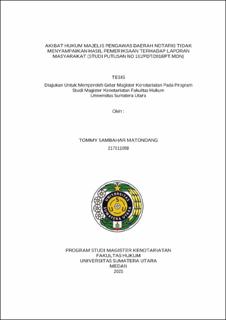| dc.contributor.advisor | Sembiring, Rosnidar | |
| dc.contributor.advisor | Suprayitno | |
| dc.contributor.author | Matondang, Tommy Sambahar | |
| dc.date.accessioned | 2025-10-10T02:01:07Z | |
| dc.date.available | 2025-10-10T02:01:07Z | |
| dc.date.issued | 2025 | |
| dc.identifier.uri | https://repositori.usu.ac.id/handle/123456789/109218 | |
| dc.description.abstract | Articles 70 and 71 of the Notary Law (UUJN) serve as the foundational provisions that define the authority and obligations of the Regional Supervisory Council (Majelis Pengawas Daerah/MPD) in carrying out its role as a notary supervisory body at the regency/city level. This study examines the rights of complainants concerning the MPD's examination results, the legal consequences arising from the MPD's failure to communicate these results, and the legal reasoning underlying the court's consideration in Decision
161/PDT/2018/PT.Mdn.
No.
This thesis is descriptive-analytical in nature and uses a normative legal research method supported by empirical data. Data collection techniques include literature study and document analysis. The data were analyzed qualitatively with conclusions drawn through deductive reasoning.
The complainant has the right to be informed that their report has been received and processed by the MPD. The MPD is obligated to provide updates on the investigation, including its final results. Such information includes whether the notary is found to have violated any regulations and what sanctions or administrative measures are imposed, if applicable. The complainant also has the right to obtain a copy or summary of the investigation outcome, subject to confidentiality and the protection of certain documents. If this right is denied, the complainant may submit a grievance to the higher supervisory bodies-the Regional Supervisory Council (MPW) or even the Central Supervisory Council (MPP). From an administrative law perspective, the MPD's failure to communicate the investigation results may be classified as a form of maladministration, particularly for neglecting legal obligations and failing to provide proper public service. This failure results in the complainant being deprived of their right to know the follow-up of their report. In Decision No. 161/PDT/2018/PT.Mdn, the appellate court considered that the complaint did not meet the administrative requirements as stipulated by the prevailing laws and regulations. Therefore, the MPD was legally justified in not proceeding to a substantive examination of the complaint. | en_US |
| dc.language.iso | id | en_US |
| dc.publisher | Universitas Sumatera Utara | en_US |
| dc.subject | Legal Consequences | en_US |
| dc.subject | Regional Supervisory Council of Notaries | en_US |
| dc.subject | Failure to Deliver Investigation Results | en_US |
| dc.subject | Public Complaint | en_US |
| dc.title | Akibat Hukum Majelis Pengawas Daerah Notaris Tidak Menyampaikan Hasil Pemeriksaan terhadap Laporan Masyarakat (Studi Putusan No 161/PDT/2018/PT.MDN) | en_US |
| dc.title.alternative | Legal Consequences of the Regional Supervisory Council of Notaries Failing to Deliver the Results of an Investigation into a Public Complaint (Case Study of Decision No. 161/Pdt/2018/PT.Mdn) | en_US |
| dc.type | Thesis | en_US |
| dc.identifier.nim | NIM217011058 | |
| dc.identifier.nidn | NIDN0002026602 | |
| dc.identifier.nidn | NIDN0101056502 | |
| dc.identifier.kodeprodi | KODEPRODI74102#Kenotariatan | |
| dc.description.pages | 116 Pages | en_US |
| dc.description.type | Tesis Magister | en_US |
| dc.subject.sdgs | SDGs 16. Peace, Justice And Strong Institutions | en_US |


